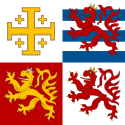Kings of Cyprus
| Kingdom of Cyprus | ||||||||||||
|
Royaume de Chypre Βασίλειον τῆς Κύπρου Vasíleion ti̱s Kýprou |
||||||||||||
|
||||||||||||
|
||||||||||||
| Capital | Nicosia | |||||||||||
| Languages |
French Greek |
|||||||||||
| Religion |
Latin Christianity Greek Christianity |
|||||||||||
| Government | Monarchy | |||||||||||
| History | ||||||||||||
| • | Established | 1192 | ||||||||||
| • | Disestablished | 1489 | ||||||||||
|
||||||||||||
| Today part of |
|
|||||||||||
The Kingdom of Cyprus was a Crusader kingdom on the island of Cyprus in the high and late Middle Ages, between 1192 and 1489. It was ruled by the French House of Lusignan. It comprised not only Cyprus, but also some possessions on the Anatolian mainland: Antalya between 1361 and 1373 and Corycus between 1361 and 1448.
The island was conquered in 1191 by King Richard I of England during the Third Crusade, from Isaac Komnenos, an upstart local governor and self-proclaimed emperor claiming the Byzantine Empire. The English king had not originally intended to conquer the island, however when his invading fleet was scattered by a storm en route to the siege of Acre, three of his ships were driven to the shores of Cyprus, where they were wrecked and sank in sight of the port of Limassol. The shipwrecked survivors were consequently taken prisoners by Komnenos and when a ship bearing Richard’s sister Joan and bride Berengaria entered the port, Komnenos refused their request to disembark for water. Richard and the rest of his fleet arrived shortly afterwards and upon hearing of the imprisonment of his shipwrecked comrades and the insults offered to his bride and sister, decided to meet Komnenos in battle. There were even rumours that Komnenus was secretly in league with Saladin in order to protect himself from his enemies in the Byzantine capital of Constantinople, the ruling Angelos family. Moreover, control of the island of Cyprus would provide a highly strategic base of operations from which to launch and supply further Crusade offensives. The English army disembarked on the shores of Limassol and engaged the Cypriots who proved no match for the English archers and heavily armoured knights. The fall of night enabled Komnenos to escape to the hills with the remainder of his army, however Richard and his troops tracked the Cypriot ruler down and raided his camp before dawn; Komnenos managed to escape again with only a few men and the next day, many Cypriot nobles came to Richard to swear fealty. In the following days, Komnenos must have realised all was lost and subsequently made an offer of 20,000 marks of gold and 500 men-at-arms to Richard, and also promised to surrender his daughter and castles as a pledge for his good behaviour.
...
Wikipedia


